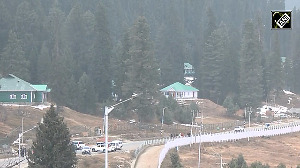It is important for India to pay close attention to both the tone and substance of authoritative remarks coming out of Pakistan, explains former foreign secretary Shyam Saran.

In the aftermath of the barbaric terrorist incident in Pahalgam, India announced a series of measures, which in their totality would bring the already meagre relations between India and Pakistan to a virtual cipher.
The stoppage of trade, transit, and cross-border travel were to be expected.
A new element is putting into abeyance the operation of the Indus Water Treaty of 1960 on the division of the waters of the Indus river and its tributaries.
The implications of this are unclear.
Would this affect the volume of river flows downstream into Pakistan, or stop short of this threshold?
Pakistan has already declared that any diversion of the river waters it is entitled to under the treaty would be considered 'an act of war'.
At this stage, this is more of a warning from India rather than a declaration of intent to alter the flows.
The careful language used implies the possibility of the abeyance being reversed if circumstances change.
Pakistan has announced a series of tit-for-tat measures mirroring those adopted by India. In the past, it has tried to go one up on India.
If India conducted five nuclear tests in 1998, Pakistan did one more.
On this occasion, Pakistan explicitly mentioned that it was doing 'one more tat' for the 'Indian tit' by stopping flights over its territory by India-owned or India-operated flights.
In order to occupy the moral high ground, Pakistan announced that travel restrictions would not apply to Sikh pilgrims.
It has also said that it could hold the Simla Agreement of 1972 in abeyance.
This may not cause any sleepless nights on the Indian side, given that Pakistan has violated virtually every provision of the treaty since its adoption.
The press conference by a group of Pakistani ministers on April 24 has not attracted much attention in India. It should.
Among those present were Foreign Minister Ishaq Dar, Defence Minister Khawaja Asif and Information Minister Attaullah Tarar.
Here are some important takeaways from the conference:
One, while any culpability for the Pahalgam terrorist attack was vehemently denied, there was an explicit accusation levelled against India for using the Tehrik-e-Taliban Pakistan and the Baloch Liberation Army as its proxies against Pakistan. There is a veiled symmetry being implied.
Two, the allegations against India in Canada and the US for alleged involvement in assassination plots against citizens of those countries were cited to project India as a State sponsor of terrorism.
It was pointed out that no such charges were ever brought against Pakistan (which is not quite true).
Three, Defence Minister Asif suggested that Indian retaliation against Pakistan could take the form of a 'wave of terrorist attacks' in its cities.
He warned that even if one Pakistani civilian was hurt or killed in the process, no Indian city and no Indian citizen would be safe from Pakistan's retaliatory actions.
This is an open threat to engage in terrorist incidents -- the very kind that Pakistan has been responsible for, including in Pahalgam.
One is not aware of such open threats to civilian populations being articulated in this brazen manner before.
Linked to this was a curious reference to an intelligence report that some 'foreigners' had landed in Srinagar with a lot of heavy equipment, possibly for carrying out suspected operations in Pakistan.
Four, the defence minister attacked Prime Minister Narendra Modi in the most virulent and abusive fashion. One has not heard such language being used by a Pakistani leader for any duly elected prime minister of India before.
This suggests that the current leadership of Pakistan does not expect any improvement of relations with India as long as the present political dispensation in India remains unchanged.
In a later and separate interview with a British television channel, Asif repeated the offensive language against PM Modi, so this is deliberate and provocative.
There were no references to the geopolitical dimension, except to emphasise that Pakistan had 'leverage' as an elected member of the UN Security Council.
No mention was made of China and of the US. Asif insisted that Pakistan was quite capable of dealing with the Indian threat itself and that no intervention of great powers was required.
In the interview to a British channel, Asif said that an all-out war was possible and that Pakistan was fully prepared for this eventuality.
He said that a confrontation between two nuclear powers should be a cause of concern to the rest of the world.
It is important for India to pay close attention to both the tone and substance of such authoritative remarks coming out of Pakistan.
They reflect the strategic calculus driving Pakistani actions against India.
There is a deliberate upping of the ante in response to what Pakistan sees as India using its own playbook to undermine its security.
There also appears to be a realisation in Islamabad that expectations of international intervention in its favour -- to prevent Indian retaliation -- are no longer assured.
In working out India's counter-strategy, these inputs will be particularly useful.
Included in this must be a review of our own security protocols to ensure that our people do not remain vulnerable to such dastardly attacks.
Feature Presentation: Aslam Hunani/Rediff.com











